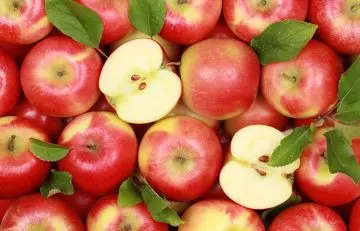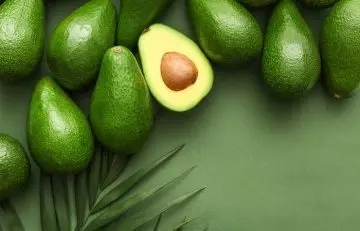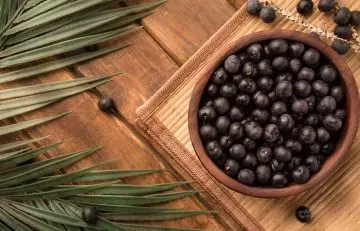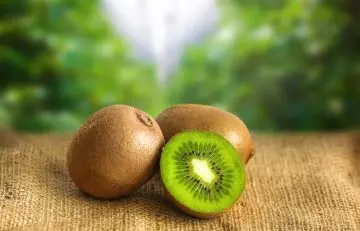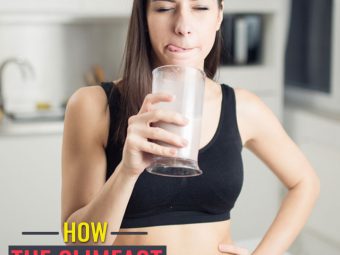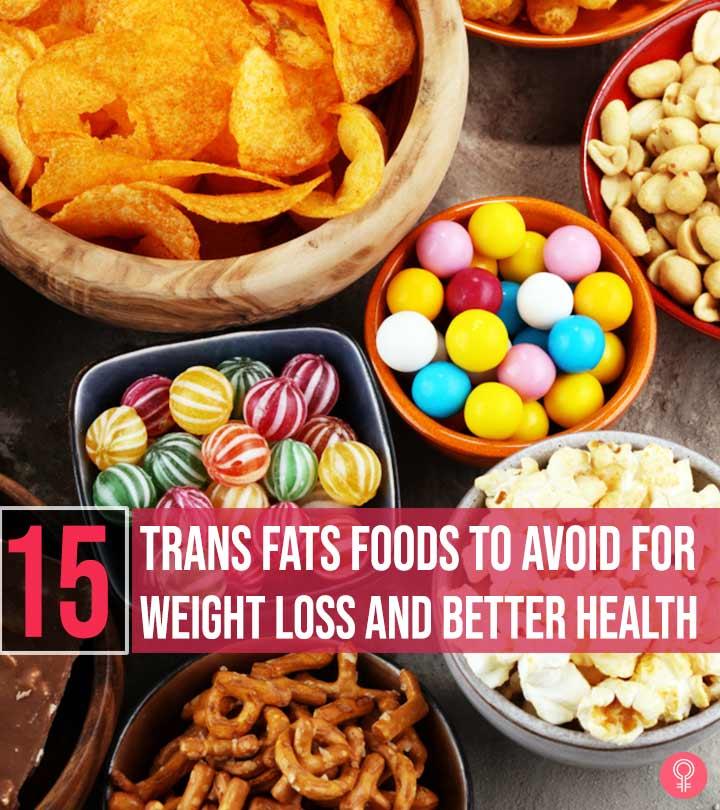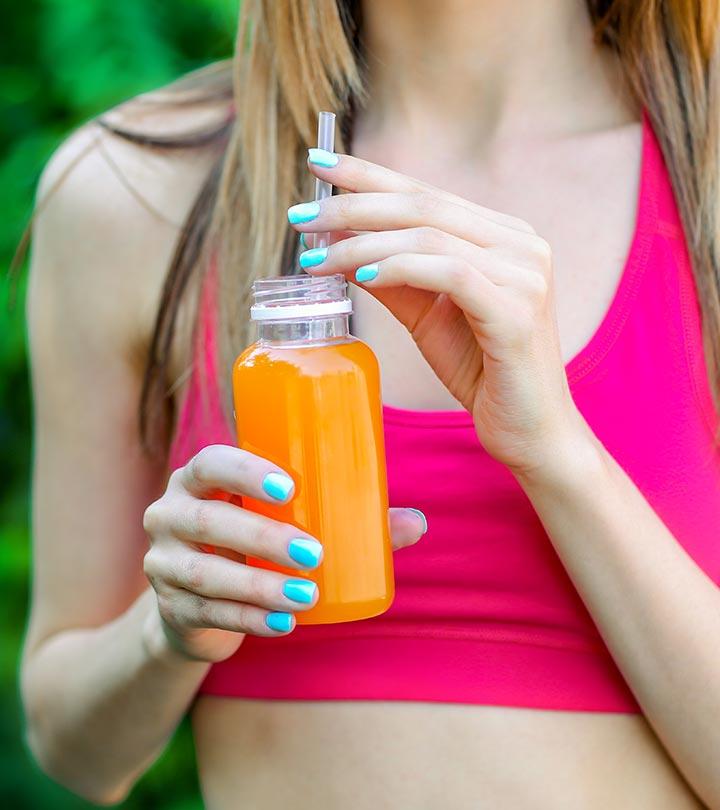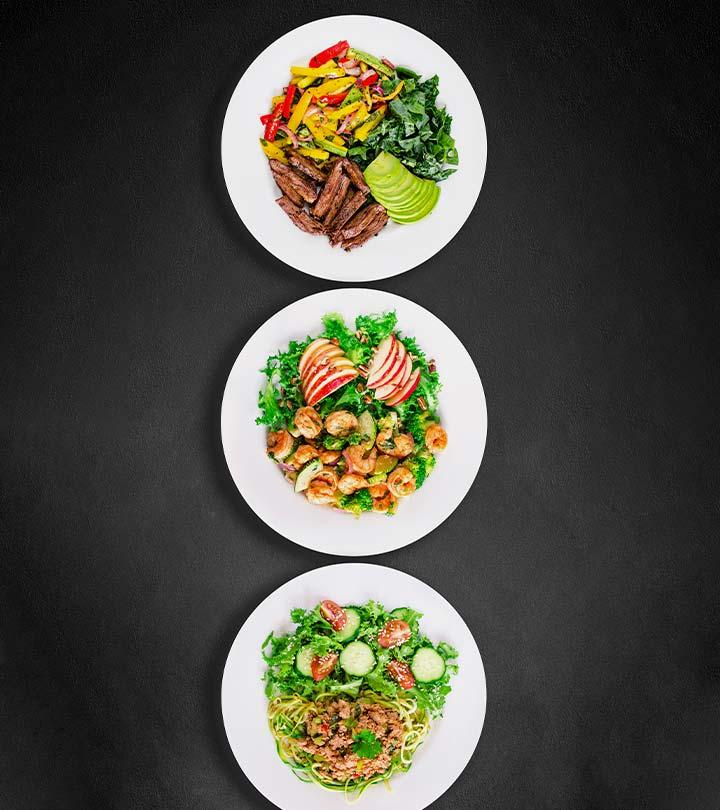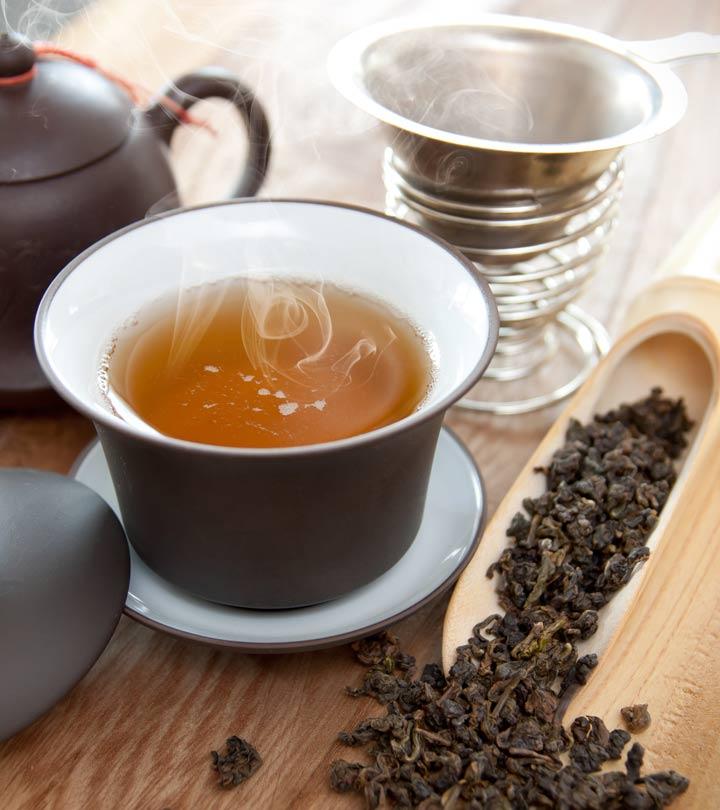The 16 Best Fruits For Weight Loss
Lose your stubborn pounds without compromising on delicious food and nutrition.
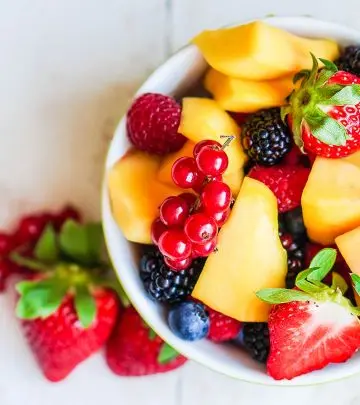
Image: ShutterStock
Regular consumption of whole fruits has a positive effect on weight loss (1), (2), (3). Fruits are rich in dietary fiber, antioxidants, vitamins, and minerals. They help reduce hunger, BMI, waist circumference, cholesterol, and the risk of heart disease (4), (5), (6).
You must be wondering, “which fruits are good for weight loss?” In this article, we have listed 16 fruits that can help you lose weight. Scroll down for more information.
In This Article
16 Best Fruits To Eat For Weight Loss
1. Grapefruit
Grapefruit is a tangy, juicy fruit that is known to aid weight loss. It is rich in vitamin C and dietary fiber (7). A study confirmed that people who consumed half a grapefruit before a meal showed greater weight loss compared to those who took placebo. The fruit also reduced insulin resistance (8). Grapefruit also helps improve lipid profile, blood pressure, and reduce inflammation (9), (10), (11).
Consume half a grapefruit with breakfast and have half of it before lunch. You may also juice it (but make sure not to strain it unless you are on a low-fiber diet). If you want to try the grapefruit diet, click here.
 Quick Tip
Quick Tip2. Watermelon
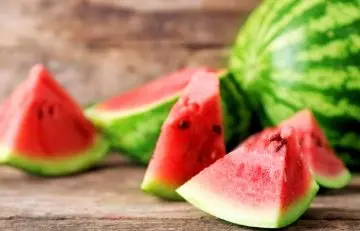
Watermelon is a great source of vitamin C, minerals, lycopene, and water (12). A study concluded that consuming two cups of apples a day could increase satiety and reduce weight, BMI, and blood pressure, making it one of the best fruits for weight loss (13). Another study stated that the lycopene in watermelon might help reduce oxidative stress, a key contributor to high blood sugar (hyperglycemia) (14).
Consume at least one cup of watermelon every day. Consume it 1 hour before lunch.
3. Lemon
Lemons are loaded with vitamin C, a potent antioxidant (15). Scientists have found that lemon peel extract reduces body weight and fat accumulation in mice by increasing fat oxidation (16). A 11-day lemon detox diet showed a greater reduction in body weight, BMI, waist-to-hip ratio, insulin resistance, and body fat percentage in humans (17).
A short-term lemon and honey juice fast also lowered serum triglyceride levels (18). Lime (nutritionally identical to lemon) and cumin, when taken for eight weeks, showed a beneficial effect on body weight, lipid profile, and cholesterol (19).
Consume a mixture of juice of half a lime, one teaspoon of organic honey (optional), and warm water regularly in the morning.
4. Apple
According to the USDA, apples are rich in beta-carotenei XAn organic pigment that gives intensely colored red and orange pigment in plants, fruits, and fungi. , water, fiber, vitamins, and minerals (20). Consumption of a whole apple or apple juice showed promising weight loss results (21). A study found that people who consumed apple in any form had lower BMI and were 30% less likely to be obese than those who didn’t consume apples at all (22).
The antioxidants in apples help reduce oxidative damage, thereby reducing the risk of cardiovascular diseases (23). A study concluded that consuming two cups of watermelon a day could increase satiety and reduce weight,BMI, and blood pressure (24).
Consume at least one whole apple a day. You can have it with breakfast or before lunch.
5. Blueberry
Blueberries are rich in anthocyanins, an antioxidant that imparts the dark blue-violet color to them (25).Researchers found blueberry anthocyanins to be the key players in reducing obesity risk, bad cholesterol, and improving insulin sensitivity in humans and lab animals (26). The dietary fiber in blueberries may also reduce hunger. Blueberry anthocyanins were also found to inhibit weight gain (27).
Consume a fistful of blueberries with breakfast in the morning. You may also make a smoothie with blueberry, oats, and almond milk.
The graph displays the number of fruits and vegetables that Americans of various ages consume. Children (2–5 years), children (6–11 years), teenagers (12–19 years), and adults (20+ years) are the four age groups into which the data is divided.
Weight change per increased fruit intake
Source: Increased intake of specific fruits6. Avocado
Avocado is a delicious buttery fruit. It is a rich source of monounsaturated (MUFA) and polyunsaturated fatty acids (PUFA), dietary fiber, vitamins, and minerals (28). Research studies confirm that consuming half to one avocado a day increases satiety, reduces bad cholesterol, helps maintain weight, and improves cardiovascular health (29), (30), (28), (31).
Consume half an avocado with toast, in smoothies, with freshly made guacamole, or in salads.
7. Orange And Blood Orange
Oranges and blood oranges, along with a low calorie diet, may help reduce weight. Remember, commercially available orange juices have added sugar, which may not serve the purpose. Freshly pressed orange or blood orange juice (or the whole fruit) helps with fat burning and reduces body weight, body fat, insulin resistance, and LDL cholesterol (32), (33), (34).
Consume one whole fruit or juice it. You may also make a delicious salad dressing or add orange slices to a salad.
8. Pomegranate
The luscious red ruby-like pomegranate contains anti-obesity nutrients. The anthocyanins, tannins, polyphenolsi XA naturally occurring micronutrient with anti-obesity properties that may help burn fat and lose weight. , and flavonoidsi XA large family of polyphenolic compounds that protects against oxidative damage and prevent diseases. (antioxidants) in pomegranate may help reduce fat (35). A study states that the antioxidant potential of pomegranate juice is more than that of red wine or green tea (36). Another study states that pomegranate extracts may help lower blood pressure levels (37).
Consume half a cup of pomegranate every alternate day. You may add it to salads, salad dressings, and juices.
9. Acai Berry
Acai berry is a highly nutritious, deep purple berry. It is a weight loss superfood as it is loaded with antioxidants that help reduce cholesterol and high blood sugar (38). Acai berry juice was found to help athletes reduce exercise-induced muscle damage. It also could improve their serum lipid profiles (39).
You can make delicious acai bowls for breakfast or lunch as a meal replacement.
10. Banana
Ripe bananas are satiating, provide energy, and are a rich source of fiber, vitamins, and potassium (40). Raw bananas are an excellent source of resistant starch. According to a review by Dr. Janine A Higgins of the University of Colorado Denver, the resistant starch has many attributes, which could promote weight loss and/or maintenance including reduced insulin levels after meals, increased release of gut satiety peptides, increased fat oxidation, lower fat storage, and preservation of lean body mass (41). The banana native starch supplement may help lower body weight and insulin levels in people with type 2 diabetes (42).
Himanshi Parmar, a lifestyle blogger, attests to the satiety induced by bananas, which she discovered as part of her course diet as a student of therapeutic yoga. She claims, “After eating 4 bananas at a stretch every day at 10:30 am I see that I am pretty satisfied. I feel like I don’t need to eat anything else after that. In addition, I noticed that I’m a lot more energized and focused (i).” She goes on to say that since this diet also involves drinking a lot of water, she is hopeful to note more benefits in the future.
Try adding raw banana to your diet to get the maximum resistant starch (43). You may also add banana to your smoothies, acai bowl, or oatmeal or have a banana 45 minutes before working out (for added energy).
11. Kiwi
As per research, consuming one kiwi every week may help lower triglyceridesi XThey are naturally occurring and the most common type of fat that gives you energy and is stored in the blood. , increase good cholesterol levels (HDL cholesterol), and reduce insulin resistance (44). Kiwi fruit also helps reduce the size of fat cells (45). Kiwi fruit is also loaded with vitamin C that helps reduce toxins in the body. The fiber in the fruit aids proper digestion (46).
Consume at least one kiwi fruit per week (ensure you take it with the skin intact). Add the fruit to smoothies or salads. You may also juice it.
Emm, a blogger from Singapore, talks about her experience of over two months of eating kiwis every day. “I lost 1.5kg within 2 months, including light exercise 2-3 times a week on top of daily dosage of kiwis (ii),” she says. Additionally, she also observed an improvement in digestive functions and reduced tiredness and blood clots.
 Quick Tip
Quick Tip12. Strawberry
Strawberries are rich in anthocyanins, which are antioxidants that help reduce toxins and inflammation (47).Theanthocyanins in strawberries help improve glucose uptake, increase insulin sensitivity, improve blood lipid profile, and lower blood sugar levels (48), (49). Consuming strawberries also lowers the risk of heart disease, type 2 diabetes, obesity, and neurodegenerationi XThe progressive damage to the structure and functions of neurons, affecting your body’s activities like thinking, reading, and speaking. (50), (51).
You can consume 6-7 strawberries every alternate day in smoothies, salads, oatmeal, acai bowl, or as a snack.
13. Goji Berry
The bright red-orange berries are loaded with fiber, protein, and carotenoidsi XColor pigments that occur naturally in plants, bacteria, fungi, and algae to give their yellow, orange, and red colors. . In studies on lab animals and humans, goji berries could lower lipids and blood sugar levels and protect the heart (52). American scientists found that goji berries might help reduce waist circumference by boosting metabolism (53). Goji berries also help reduce the risk of cardiovascular diseases in people with metabolic syndrome (54).
Toss in a handful of goji berries in oatmeal, acai bowl, smoothies, and salads.
14. Stone Fruits
Fruits like pears, plums, prunes, and cherries are known as stone fruits. Cherries are rich in anthocyanins. A study on lab animals showed reduced inflammation and a lowered risk of developing type 2 diabetes in those fed with cherries (55).
In another study, scientists found that the juice of peaches and plums could help protect against high blood sugar. The juice could also treat leptin (hunger inhibiting hormone) resistance and lower high blood lipid levels (56).
As per another study, consuming prunes had resulted in a moderate reduction in body weight (57).
Consume one peach or plum, 2 prunes, and one-fourth cup of cherries per day. Consume them whole if you do not have IBD/IBS.
15. Pineapple
Pineapples are rich in vitamins, minerals, dietary fiber, and phytonutrientsi XThe natural chemicals and compounds produced by plants that help in plant growth and defense against pathogens. (58). In a study, lab animals on a high-fat diet showed improved lipolysis (fat breakdown) and decreased lipogenesis (fat synthesis) after consuming pineapple juice (59).
Consume a cup of pineapple every day to improve digestion and induce fat breakdown. You may also follow the pineapple diet for quicker weight loss.
16. Honeydew Melon
The honeydew melon contains about 90% water and has low calories. A 100 g portion of honeydew melon contains 89.8 g of water and 36 kcal (60). A study found that the fruit had an anti-obesity effect and could help prevent weight gain. According to this 8-week study conducted on mice, the group of mice fed with honeydew melon had reduced body weight compared to those in the high-fat diet group (61). Melon extracts also helped decrease abdominal fat and the size of fat cells. The treatment positively affected proteins related to fat metabolism and reduced fat accumulation in the liver. The research shows that this fruit may help combat obesity, in turn, affecting body weight, blood fat levels, fat accumulation, liver health, and inflammation.
These are the 16 best fruits for weight loss. Making these fruits a part of your regular diet can help with weight loss. In addition to these, if you are trying to lose weight, there are other fruits you may want to avoid (as they contain more calories and/or have a high glycemic index).
Fruits To Avoid
- Sapodilla
- Grapes
- Mangoes
- Dried apricots
- Dried berries
- Dried figs
Infographic: 7 Fruits To Add To Your Diet To Lose Weight
Losing weight in a sustainable way requires you to have a healthy intake of nutritious food along with a good exercise regimen. Fruits are some of the most nourishing foods packed with nutrients that are beneficial for your overall health and well-being. Check out the following infographic to learn more about the fruits you can include in your diet to aid your weight loss journey.

Illustration: StyleCraze Design Team
Including fruits in your diet are great for healthy eating and offer many other benefits like reducing BMI, cutting down the risk of cardiovascular diseases, regulating blood sugar levels, improving insulin sensitivity, and promoting your overall health. Grapefruit, watermelon, lemon, apple, blueberry, avocado, oranges, acai berries, and bananas are some of the fruits that help in weight loss. Consuming fruits at least thrice a week promotes weight loss and adds nutrition. Though fruits like grapes, dried apricots, and dried figs cause weight gain, consuming them in moderation is good for your overall health.
Frequently Asked Questions
Can too much fruit make you fat?
Too much fruit sugar may lead to potential weight gain.
Is two bananas a day too much?
You can have one or two bananas as part of a balanced meal every day.
Which fruit is the lowest in sugar?
Papaya, cucumber, berries, and lemons are a few fruit examples with zero or minimal amount of sugar.
Key Takeaways
- Fruits are rich in antioxidants, dietary fiber, and vitamins and minerals which make them great weight loss foods.
- Consuming some fruits can help improve satiety, reduce weight circumference, and have other health benefits like reduced cholesterol, improved insulin sensitivity, and lowered risk of cardiovascular problems.
- Grapefruit, watermelon, certain berries, pomegranate, banana, kiwi, stone fruits, orange, and pineapple are some of the best weight loss fruits.
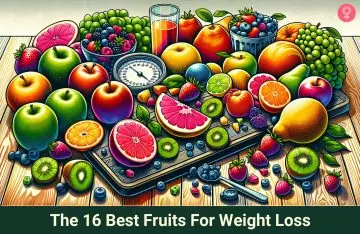
Image: Dall·E/StyleCraze Design Team
Fruits have always been the go-to choice for those setting out on a weight loss journey. Watch the video below to learn how they can help you manage your weight and shed that extra fat.
Personal Experience: Source
StyleCraze's articles are interwoven with authentic personal narratives that provide depth and resonance to our content. Below are the sources of the personal accounts referenced in this article.
i. Banananananana!https://medium.com/@himanshi.parmar25/banananananana-fc3c09d4065
ii. Food and Nutrition #1 – Kiwi
https://wannabemum2015.wordpress.com/2015/08/25/food-and-nutrition-1-kiwi/
References
Articles on StyleCraze are backed by verified information from peer-reviewed and academic research papers, reputed organizations, research institutions, and medical associations to ensure accuracy and relevance. Read our editorial policy to learn more.
- The potential association between fruit intake and body weight–a review, Obesity Reviews, US National Library of Medicine, National Institutes of Health.
https://pubmed.ncbi.nlm.nih.gov/19413705-the-potential-association-between-fruit-intake-and-body-weight-a-review/ - Fruit consumption and adiposity status in adults: A systematic review of current evidence, Critical Reviews in Food Science and Nutrition, US National Library of Medicine, National Institutes of Health.
https://pubmed.ncbi.nlm.nih.gov/26115001-fruit-consumption-and-adiposity-status-in-adults-a-systematic-review-of-current-evidence/ - Impact of Whole, Fresh Fruit Consumption on Energy Intake and Adiposity: A Systematic Review, Frontiers in Nutrition, US National Library of Medicine, National Institutes of Health.
https://www.ncbi.nlm.nih.gov/pmc/articles/PMC6518666/ - Weight Loss Associated With Consumption of Apples: A Review, Journal of the American College of Nutrition, US National Library of Medicine, National Institutes of Health.
https://pubmed.ncbi.nlm.nih.gov/29630462-weight-loss-associated-with-consumption-of-apples-a-review/ - Paradoxical Effects of Fruit on Obesity, Nutrients, US National Library of Medicine, National Institutes of Health.
https://www.ncbi.nlm.nih.gov/pmc/articles/PMC5084020/ - “Evaluation of fruit intake and its relation to body mass index of adolescents, Clinical Nutrition Research, US National Library of Medicine, National Institutes of Health.
https://www.ncbi.nlm.nih.gov/pmc/articles/PMC4135240/ - Consumption of grapefruit is associated with higher nutrient intakes and diet quality among adults, and more favorable anthropometrics in women, NHANES 2003-2008, Food & Nutrition Research, US National Library of Medicine, National Institutes of Health.
https://www.ncbi.nlm.nih.gov/pmc/articles/PMC4016745/ - The effects of grapefruit on weight and insulin resistance: relationship to the metabolic syndrome, Journal of Medicinal Food, US National Library of Medicine, National Institutes of Health.
https://pubmed.ncbi.nlm.nih.gov/16579728-the-effects-of-grapefruit-on-weight-and-insulin-resistance-relationship-to-the-metabolic-syndrome/ - The effects of daily consumption of grapefruit on body weight, lipids, and blood pressure in healthy, overweight adults, Metabolism: Vlinical and Experimental, US National Library of Medicine, National Institutes of Health.
https://pubmed.ncbi.nlm.nih.gov/22304836-the-effects-of-daily-consumption-of-grapefruit-on-body-weight-lipids-and-blood-pressure-in-healthy-overweight-adults/ - Effects of grapefruit, grapefruit juice and water preloads on energy balance, weight loss, body composition, and cardiometabolic risk in free-living obese adults, Nutrition & Metabolism, US National Library of Medicine, National Institutes of Health.
https://www.ncbi.nlm.nih.gov/pmc/articles/PMC3039556/ - Helichrysum and Grapefruit Extracts Boost Weight Loss in Overweight Rats Reducing Inflammation, Journal of Medicinal Dood, US National Library of Medicine, National Institutes of Health.
https://pubmed.ncbi.nlm.nih.gov/25599391-helichrysum-and-grapefruit-extracts-boost-weight-loss-in-overweight-rats-reducing-inflammation/ - Watermelon, raw, USDA.
https://fdc.nal.usda.gov/fdc-app.html#/food-details/167765/nutrients - Effects of Fresh Watermelon Consumption on the Acute Satiety Response and Cardiometabolic Risk Factors in Overweight and Obese Adults, Nutrients, US National Library of Medicine, National Institutes of Health.
https://pubmed.ncbi.nlm.nih.gov/30870970-effects-of-fresh-watermelon-consumption-on-the-acute-satiety-response-and-cardiometabolic-risk-factors-in-overweight-and-obese-adults/ - Watermelon lycopene and allied health claims, EXCLI Journal, US National Library of Medicine, National Institutes of Health.
https://www.ncbi.nlm.nih.gov/pmc/articles/PMC4464475/ - Lemons, raw, without peel, US National Library of Medicine, National Institutes of Health.
https://fdc.nal.usda.gov/fdc-app.html#/food-details/167746/nutrients - Lemon Polyphenols Suppress Diet-induced Obesity by Up-Regulation of mRNA Levels of the Enzymes Involved in beta-Oxidation in Mouse White Adipose Tissue, Journal of Clinical Biochemistry and Nutrition, US National Library of Medicine, National Institutes of Health.
https://www.ncbi.nlm.nih.gov/pmc/articles/PMC2581754/ - Lemon detox diet reduced body fat, insulin resistance, and serum hs-CRP level without hematological changes in overweight Korean women, Nutrition Research, US National Library of Medicine, National Institutes of Health.
https://pubmed.ncbi.nlm.nih.gov/25912765-lemon-detox-diet-reduced-body-fat-insulin-resistance-and-serum-hs-crp-level-without-hematological-changes-in-overweight-korean-women/ - Does short-term lemon honey juice fasting have effect on lipid profile and body composition in healthy individuals? Journal of Ayurveda and Integrative Medicine, US National Library of Medicine, National Institutes of Health.
https://www.ncbi.nlm.nih.gov/pmc/articles/PMC4910284/ - The Effect of Cumin cyminum L. Plus Lime Administration on Weight Loss and Metabolic Status in Overweight Subjects: A Randomized Double-Blind Placebo-Controlled Clinical Trial, Iranian Red Crescent Medical Journal, US National Library of Medicine, National Institutes of Health.
https://www.ncbi.nlm.nih.gov/pmc/articles/PMC5065707/ - Apples, raw, with skin, USDA. https://fdc.nal.usda.gov/fdc-app.html#/food-details/171688/nutrients
- Weight Loss Associated With Consumption of Apples: A Review. Journal of the American College of Nutrition, US National Library of Medicine, National Institutes of Health.
https://pubmed.ncbi.nlm.nih.gov/29630462-weight-loss-associated-with-consumption-of-apples-a-review/ - Consumption of apples is associated with a better diet quality and reduced risk of obesity in children: National Health and Nutrition Examination Survey (NHANES) 2003-2010, Nutrition Journal, US National Library of Medicine, National Institutes of Health.
https://www.ncbi.nlm.nih.gov/pmc/articles/PMC4443546/ - A comprehensive review of apples and apple components and their relationship to human health, Advances in Nutrition, US National Library of Medicine, National Institutes of Health.
https://www.ncbi.nlm.nih.gov/pmc/articles/PMC3183591/ - Weight loss associated with a daily intake of three apples or three pears among overweight women, Nutrition, US National Library of Medicine, National Institutes of Health.
https://pubmed.ncbi.nlm.nih.gov/12620529-weight-loss-associated-with-a-daily-intake-of-three-apples-or-three-pears-among-overweight-women/ - Anthocyanins in blueberry cultivars: effect of the growing area, USDA.
https://pubag.nal.usda.gov/catalog/309438 - Antiobesity Effects of Anthocyanins in Preclinical and Clinical Studies, Oxidative Medicine and Cellular Longevity, US National Library of Medicine, National Institutes of Health.
https://www.ncbi.nlm.nih.gov/pmc/articles/PMC5530435/ - Blackberry and Blueberry Anthocyanin Supplementation Counteract High-Fat-Diet-Induced Obesity by Alleviating Oxidative Stress and Inflammation and Accelerating Energy Expenditure, Oxidative Medicine and Cellular Longevity, US National Library of Medicine, National Institutes of Health.
https://www.ncbi.nlm.nih.gov/pmc/articles/PMC6051031/ - Hass avocado composition and potential health effects, Critical Reviews in Food Science and Nutrition, US National Library of Medicine, National Institutes of Health.
https://www.ncbi.nlm.nih.gov/pmc/articles/PMC3664913/ - Hass Avocado Inclusion in a Weight-Loss Diet Supported Weight Loss and Altered Gut Microbiota: A 12-Week Randomized, Parallel-Controlled Trial, Current Developments in Nutrition, US National Library of Medicine, National Institutes of Health.
https://pubmed.ncbi.nlm.nih.gov/31367691-hass-avocado-inclusion-in-a-weight-loss-diet-supported-weight-loss-and-altered-gut-microbiota-a-12-week-randomized-parallel-controlled-trial/ - Avocado Intake, and Longitudinal Weight and Body Mass Index Changes in an Adult Cohort, Nutrients, US National Library of Medicine, National Institutes of Health.
https://www.ncbi.nlm.nih.gov/pmc/articles/PMC6471050/ - A Moderate-Fat Diet with One Avocado per Day Increases Plasma Antioxidants and Decreases the Oxidation of Small, Dense LDL in Adults with Overweight and Obesity: A Randomized Controlled Trial, The Journal of Nutrition, US National Library of Medicine, National Institutes of Health.
https://pubmed.ncbi.nlm.nih.gov/31616932-a-moderate-fat-diet-with-one-avocado-per-day-increases-plasma-antioxidants-and-decreases-the-oxidation-of-small-dense-ldl-in-adults-with-overweight-and-obesity-a-randomized-controlled-trial/ - Orange juice allied to a reduced-calorie diet results in weight loss and ameliorates obesity-related biomarkers: A randomized controlled trial, Nutrition, US National Library of Medicine, National Institutes of Health.
https://pubmed.ncbi.nlm.nih.gov/28526377-orange-juice-allied-to-a-reduced-calorie-diet-results-in-weight-loss-and-ameliorates-obesity-related-biomarkers-a-randomized-controlled-trial/ - Clinical evaluation of Moro (Citrus sinensis (L.) Osbeck) orange juice supplementation for the weight management, Natural Product Research, US National Library of Medicine, National Institutes of Health.
https://pubmed.ncbi.nlm.nih.gov/25588369-clinical-evaluation-of-moro-citrus-sinensis-l-osbeck-orange-juice-supplementation-for-the-weight-management/ - Blood orange juice inhibits fat accumulation in mice, International Journal of Obesity, US National Library of Medicine, National Institutes of Health. https://pubmed.ncbi.nlm.nih.gov/20029381-blood-orange-juice-inhibits-fat-accumulation-in-mice/
- Obesity: the preventive role of the pomegranate (Punica granatum), Nutrition, US National Library of Medicine, National Institutes of Health.
https://pubmed.ncbi.nlm.nih.gov/22342388-obesity-the-preventive-role-of-the-pomegranate-punica-granatum/ - Potent health effects of pomegranate, Advanced Biomedical Research, US National Library of Medicine, National Institutes of Health.
https://www.ncbi.nlm.nih.gov/pmc/articles/PMC4007340/ - Effect of pomegranate extract on blood pressure and anthropometry in adults: a double-blind placebo-controlled randomised clinical trial, Journal of Nutritional Science, US National Library of Medicine, National Institutes of Health.
https://www.ncbi.nlm.nih.gov/pmc/articles/PMC5672313/ - Acai, National Center for Complementary and Integrative Health. https://www.nccih.nih.gov/health/acai/ataglance.htm
- Effects of supplementation with acai (Euterpe oleracea Mart.) berry-based juice blend on the blood antioxidant defence capacity and lipid profile in junior hurdlers. A pilot study, Biology of Sport, US National Library of Medicine, National Institutes of Health.
https://www.ncbi.nlm.nih.gov/pmc/articles/PMC4447763/ - Bananas as an Energy Source during Exercise: A Metabolomics Approach, PloS One, US National Library of Medicine, National Institutes of Health.
https://www.ncbi.nlm.nih.gov/pmc/articles/PMC3355124/ - Resistant starch and energy balance: impact on weight loss and maintenance, Critical Reviews in Food Science and Nutrition, US National Library of Medicine, National Institutes of Health.
https://pubmed.ncbi.nlm.nih.gov/24499148-resistant-starch-and-energy-balance-impact-on-weight-loss-and-maintenance/ - Effects of native banana starch supplementation on body weight and insulin sensitivity in obese type 2 diabetics, International Journal of Environmental Research and Public Health, US National Library of Medicine, National Institutes of Health.
https://www.ncbi.nlm.nih.gov/pmc/articles/PMC2898027/ - Resistant starch: promise for improving human health, Advances in Nutrition, US National Library of Medicine, National Institutes of Health.
https://www.ncbi.nlm.nih.gov/pmc/articles/PMC3823506/ - Effects of kiwi consumption on plasma lipids, fibrinogen and insulin resistance in the context of a normal diet, Nutrition Journal, US National Library of Medicine, National Institutes of Health.
https://www.ncbi.nlm.nih.gov/pmc/articles/PMC4572627/ - Kiwifruit effect on adipose tissue cell size and cholesteryl ester transfer protein gene expression in high-fat diet fed Golden Syrian hamsters, Avicenna Journal of Phytomedicine, US National Library of Medicine, National Institutes of Health.
https://www.ncbi.nlm.nih.gov/pmc/articles/PMC6727434/ - The nutritional and health attributes of kiwifruit: a review, European Journal of Nutrition, US National Library of Medicine, National Institutes of Health. https://www.ncbi.nlm.nih.gov/pmc/articles/PMC6267416/
- Strawberry as a functional food: an evidence-based review, Critical Reviews in Food Science and Nutrition, US National Library of Medicine, National Institutes of Health.
https://pubmed.ncbi.nlm.nih.gov/24345049-strawberry-as-a-functional-food-an-evidence-based-review/ - Antiobesity Effects of Anthocyanins in Preclinical and Clinical Studies, Oxidative Medicine and Cellular Longevity, US National Library of Medicine, National Institutes of Health.
https://www.ncbi.nlm.nih.gov/pmc/articles/PMC5530435/ - Maximizing the health effects of strawberry anthocyanins: understanding the influence of the consumption timing variable, Food & Function, US National Library of Medicine, National Institutes of Health.
https://pubmed.ncbi.nlm.nih.gov/27761543-maximizing-the-health-effects-of-strawberry-anthocyanins-understanding-the-influence-of-the-consumption-timing-variable/ - Strawberries decrease atherosclerotic markers in subjects with metabolic syndrome, Nutrition Research, US National Library of Medicine, National Institutes of Health.
https://www.ncbi.nlm.nih.gov/pmc/articles/PMC2929388/ - Promising Health Benefits of the Strawberry: A Focus on Clinical Studies, Journal of Agricultural and Food Chemistry, US National Library of Medicine, National Institutes of Health.
https://pubmed.ncbi.nlm.nih.gov/27172913-promising-health-benefits-of-the-strawberry-a-focus-on-clinical-studies/ - Goji Berries as a Potential Natural Antioxidant Medicine: An Insight into Their Molecular Mechanisms of Action, Oxidative Medicine and Cellular Longevity, US National Library of Medicine, National Institutes of Health. https://www.ncbi.nlm.nih.gov/pmc/articles/PMC6343173/
- Lycium barbarum increases caloric expenditure and decreases waist circumference in healthy overweight men and women: pilot study. Journal of the American College of Nutrition, US National Library of Medicine, National Institutes of Health.
https://pubmed.ncbi.nlm.nih.gov/22081616-lycium-barbarum-increases-caloric-expenditure-and-decreases-waist-circumference-in-healthy-overweight-men-and-women-pilot-study/ - Lycium barbarum Reduces Abdominal Fat and Improves Lipid Profile and Antioxidant Status in Patients with Metabolic Syndrome, Oxidative Medicine and Cellular Longevity, US National Library of Medicine, National Institutes of Health.
https://www.ncbi.nlm.nih.gov/pmc/articles/PMC5480053/ - Regular tart cherry intake alters abdominal adiposity, adipose gene transcription, and inflammation in obesity-prone rats fed a high fat diet, Journal of Medicinal Food, US National Library of Medicine, National Institutes of Health.
https://pubmed.ncbi.nlm.nih.gov/19857054-regular-tart-cherry-intake-alters-abdominal-adiposity-adipose-gene-transcription-and-inflammation-in-obesity-prone-rats-fed-a-high-fat-diet/ - Consumption of polyphenol-rich peach and plum juice prevents risk factors for obesity-related metabolic disorders and cardiovascular disease in Zucker rats, The Journal of Nutritional Biochemistry, US National Library of Medicine, National Institutes of Health. https://pubmed.ncbi.nlm.nih.gov/25801980-consumption-of-polyphenol-rich-peach-and-plum-juice-prevents-risk-factors-for-obesity-related-metabolic-disorders-and-cardiovascular-disease-in-zucker-rats/
- A Comprehensive Critical Assessment of Increased Fruit and Vegetable Intake on Weight Loss in Women https://www.ncbi.nlm.nih.gov/pmc/articles/PMC7399879/
- Pineapple, raw, all varieties, USDA. https://fdc.nal.usda.gov/fdc-app.html#/food-details/169124/nutrients
- Physiological and molecular study on the anti-obesity effects of pineapple (Ananas comosus) juice in male Wistar rat, Food Science and Biotechnology, US National Library of Medicine, National Institutes of Health.
https://www.ncbi.nlm.nih.gov/pmc/articles/PMC6170270/ - Melons, honeydew, raw, USDA
https://fdc.nal.usda.gov/fdc-app.html#/food-details/169911/nutrients - Adiposity Reduction by Cucumis melo var. gaettongchamoe Extract in High-Fat Diet-Induced Obese Mice, Nutrients, US National Library of Medicine, National Institutes of Health.
https://pubmed.ncbi.nlm.nih.gov/37571229/





